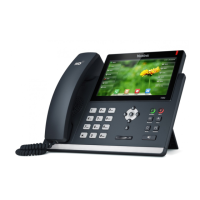Administrator’s Guide for SIP-T2 Series/T19(P) E2/T4 Series/CP860 IP Phones
626
simply based on the DiffServ class. The DSCP value ranges from 0 to 63 with each DSCP
specifying a particular per-hop behavior (PHB) applicable to a packet. A PHB refers to
the packet scheduling, queuing, policing, or shaping behavior of a node on any given
packet.
Four standard PHBs available to construct a DiffServ-enabled network and achieve
QoS:
Class Selector PHB -- backwards compatible with IP precedence. Class Selector
code points are of the form “xxx000”. The first three bits are the IP precedence bits.
These class selector PHBs retain almost the same forwarding behavior as nodes
that implement IP precedence-based classification and forwarding.
Expedited Forwarding PHB -- the key ingredient in DiffServ model for providing a
low-loss, low-latency, low-jitter and assured bandwidth service.
Assured Forwarding PHB -- defines a method by which BAs (Bandwidth Allocations)
can be given different forwarding assurances.
Default PHB -- specifies that a packet marked with a DSCP value of “000000” gets
the traditional best effort service from a DS-compliant node.
VoIP is extremely bandwidth and delay-sensitive. QoS is a major issue in VoIP
implementations, regarding how to guarantee that packet traffic not be delayed or
dropped due to interference from other lower priority traffic. VoIP can guarantee
high-quality QoS only if the voice and the SIP packets are given priority over other kinds
of network traffic. IP phones support the DiffServ model of QoS.
Voice QoS
In order to make VoIP transmissions intelligible to receivers, voice packets should not be
dropped, excessively delayed, or made to suffer varying delay. DiffServ model can
guarantee high-quality voice transmission when the voice packets are configured to a
higher DSCP value.
SIP QoS
SIP protocol is used for creating, modifying and terminating two-party or multi-party
sessions. To ensure good voice quality, SIP packets emanated from IP phones should be
configured with a high transmission priority.
DSCPs for voice and SIP packets can be specified respectively.
Note
For voice and SIP packets, the IP phone obtains DSCP info from the network policy if LLDP
feature is enabled, which takes precedence over manual settings. For more information
on LLDP, refer to LLDP on page 591.

